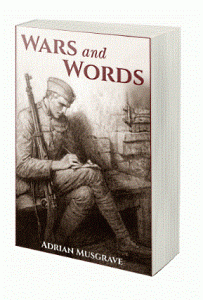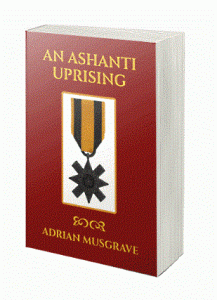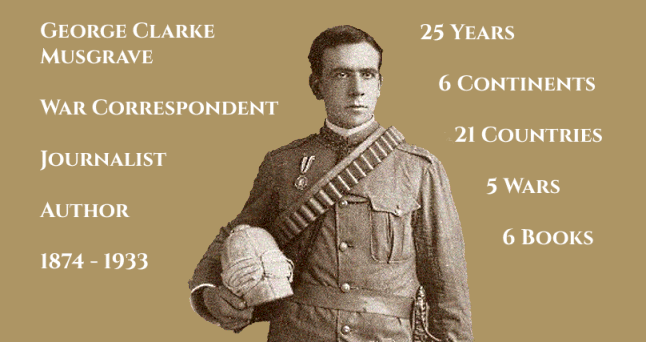Adrian Musgrave Showcase Interview
Self-Publisher’s Showcase: Today we are joined by Adrian Musgrave, author of Wars and Words. Welcome to the Showcase Lounge, Adrian.
Adrian Musgrave: Thanks for inviting me.
SPS: For any of our readers that haven’t come across your work previously, can you take a moment to tell us all a little about yourself and your work?
AM: A few years ago — I think it was in 2009 — my granddaughter took up an interest in genealogy and constructed a family tree, revealing my great-uncle, George Clarke Musgrave. I knew almost nothing about him at the time but I worked with her on this and with relatively straightforward first stage research, we discovered that George Clarke was a war correspondent and journalist, seeing action with both British and American forces in West Africa, Cuba, South Africa, China, the Balkans and France. His articles from these conflicts were published in many national and international journals including: the Illustrated London News, the London Chronicle, the Daily Mail, Strand Magazine, Black and White Review and the New York Times. He also wrote a number of books which were readily published and well received by audiences on both sides of the Atlantic. Unfortunately, these are now out of print and first editions are rare and expensive. I believe, though, that his words should be read and, in seeking to bring his library back to life, I have written authentic versions of his six books with a particular focus on preserving the action, the excitement, the drama and the emotion of his original narrative. These now form a series with the title of “Wars and Words”, within which I have also sought to knit together the diverse and tangled threads of my great-uncle’s career which spanned some twenty-five years in which he grew from a raw but determined neophyte of the media circus to a seasoned, brilliantly analytical and highly respected observer of war.
SPS: What are your perfect writing conditions, and how often do you write?
AM: I write pretty much every day — sometimes a chapter or two, sometimes just a few notes. I like to work from home, where I have a little niche in our living room with my computer, a storage unit for my books and notes — and a very supportive wife who keeps me well supplied with tea !!
 SPS: Can you put your finger on the moment you decided that you wanted to publish your work?
SPS: Can you put your finger on the moment you decided that you wanted to publish your work?
AM: Over the last ten years or so I have spent lot of time on research and it is only relatively recently that I completed the first books in the “Wars and Words” series. This was in 2017 and that’s when I started my journey on the publishing path.
SPS: Why do you think it is that you have found yourself writing in the style that you do?
AM: When I started putting pen to paper, I experienced some difficulties in maintaining an appropriate focus in my writing. I think, though, that by deciding to keep to a first person narrative throughout the series, I have managed to maintain consistency and, I hope, readability.
SPS: What would you say, if anything, best differentiates you from other authors?
AM: My work hovers somewhere between biography, adventure, genealogy and military history. I am constantly striving to blend all of this with the factual accuracy and style of a dedicated war correspondent and journalist writing in the field.
SPS: Where does the inspiration for your work come from?
AM: I never knew my great-uncle, George Clarke Musgrave but for more than a decade now I have lived with him, walked with him and dreamed with him. He died in 1932 and the task of recounting his life and times has slipped several branches down the family tree to me and now it is with some trepidation, but a keen desire to keep true to his memory, that I have dedicated myself to channelling his stories and bringing his library back to life.
SPS: Have you received a favourite review of your work?
 AM: Actually, it’s early days and I’m still waiting for reviews for most of my books. One that does come to mind, though, was for “An Ashanti Uprising”, the first book of the series. What I liked about this was that, while the reviewer found the story exciting and interesting, he commented that the language used in the narrative was rather old and dated. Well, since the original book was written in 1896, and this was just about what I was trying to achieve, for me this was a good review.
AM: Actually, it’s early days and I’m still waiting for reviews for most of my books. One that does come to mind, though, was for “An Ashanti Uprising”, the first book of the series. What I liked about this was that, while the reviewer found the story exciting and interesting, he commented that the language used in the narrative was rather old and dated. Well, since the original book was written in 1896, and this was just about what I was trying to achieve, for me this was a good review.
SPS: What’s next on the self-publishing horizon for yourself?
AM: In addition to his books, George Clarke Musgrave produced a wide-ranging portfolio of articles, reports, letters and essays on many subjects. He also kept diaries with records of his day-to-day experiences. Unfortunately, many of these have been lost, damaged or destroyed and there is no longer a complete collection available. From those that do remain, though, I am editing and compiling his notes into dated records that will form the content of further books in the “Wars and Words” series. This is a work in progress.
SPS: Was the Self-/Indie-Published route always your preferred route for your work?
AM: Not really. I didn’t give it a lot of thought at first because for some years I concentrated on research and the actual writing came later. Then, when I was ready to publish, I came up against the “brick wall” that, I guess, many new authors experience. I found the whole process of querying and submitting manuscripts quite frustrating, so finding out that it was possible to publish my own work was something of a revelation.
SPS: Has the experience so far been all that you thought it would be?
AM: The self-publishing process is hard work but, in my opinion, well worth it because there’s nothing more exciting than seeing, handling and reading that actual book when it’s published.
SPS: If you could give one piece of advice for someone looking to get into writing, what would it be?
AM: Believe in your work, believe in yourself, ignore the self-doubt and keep going.
SPS: Before we bring this interview to a close, it’s your chance to name-drop. Anyone who you feel is deserving of more recognition at present or someone whose writing you have recently enjoyed? Now is your chance to spread the word…
AM: Top of my list are all of George Clarke Musgrave’s books together with related works on military history and genealogy. I have also studied many journals, auto-biographies and biographies written by or about some of the key people with whom my great-uncle was involved. This is a long list but includes: Prince Henry of Battenberg, Sir Francis Scott, Lord Roberts, Lord Wolsley, Baden-Powell, General Buller, Winston Churchill, General Garcia, leader of the Cuban insurgents and President Theodore “Teddy” Roosevelt, Colonel of the Rough Riders in the Spanish-American war in 1898, with whom George Clarke developed a life-long friendship.
SPS: Thank you for joining us today, Adrian, and all the best for the future.
AM: Again, thanks for inviting me — I’ve really enjoyed our chat.
SPS: For more information on Adrian and his work, please do visit:














Leave a Reply